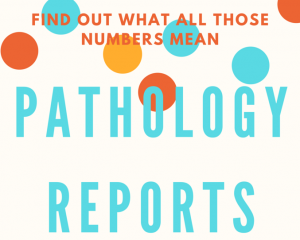$40 Pathology Report Reads and Understanding Your Pathology Report
 Every once in awhile something hits my Facebook feed that makes me wonder how it got there and who means what by it. Beyond the family updates, births, deaths, marriages, divorces, Cubs and Blackhawk updates most recently, I saw one for “Find Out What All Those Numbers Mean – Pathology Reports”. The post (and the image before I cropped it out) contained an email to send your report to and for $40 someone, who appears to be a “health and nutrition specialist” perhaps in another country will give you a “full assessment” of your pathology report and “tell you what all those numbers mean”. Even the colored dots are reminiscent of some of the College of American Pathologists logo and accreditation marks.
Every once in awhile something hits my Facebook feed that makes me wonder how it got there and who means what by it. Beyond the family updates, births, deaths, marriages, divorces, Cubs and Blackhawk updates most recently, I saw one for “Find Out What All Those Numbers Mean – Pathology Reports”. The post (and the image before I cropped it out) contained an email to send your report to and for $40 someone, who appears to be a “health and nutrition specialist” perhaps in another country will give you a “full assessment” of your pathology report and “tell you what all those numbers mean”. Even the colored dots are reminiscent of some of the College of American Pathologists logo and accreditation marks.
Ironically, this is something most physicians, including pathologists, do not do for our patients. Perhaps an internist will call you back and say “your hemoglobin is still a little low” or “we need to watch that creatinine” with perhaps some more labs in days or weeks to follow with appropriate management. The last time a physician ran labs on me I saw a note scribbled on the scanned lab report in my patient portal that read “All labs and EKG normal” and a voice mail to that effect. Actually, my serum chloride was a little low and I think there was evidence of a remote MI on my EKG but what do I know?
The point is that most physicians are not going to do this, pathologists included, because there are not enough hours in the day and to do so largely without reimbursement for doing so, unless, say it was $40 an interpretation. When you consider the costs and reimbursements themselves of routine complete blood counts (CBCs) and serum chemistries, I think $40 is out of range of what someone would pay. Or would they to have a full analysis of their laboratory tests with an explanation of what exactly BUN is or what and anion gap is even if it is “normal” and why someone may have ordered it?
Then we could hire medical students to screen them at a fraction of the cost and use templated reports with a full breakdown of what the issues may be, or may not be.
The reality is we as “healthcare providers” – we are not physicians recall in today’s healthcare constructs do not actually provide what a nutritionist is willing to provide and I gather people will be willing to pay for. This is not a slam on nutritionists, it is a criticism of what pathologists should be able to do as an added value to healthcare, as dysfunctional as it is. Pathologists in New York of course don’t need to worry about this since they are not even allowed to talk to patients (see: Pathologists Cannot Talk to Patients? Fuggedaboutit).
So, I have a proposal for the pathologist community. Under a new slogan I recently trademarked, “Changing Lives One Slide at a Time”, during this Medical Laboratory Professionals Week, I am seeking volunteer pathologists to help patients understand their pathology reports. Clearly there are differences between interpreting information we share with clinicians and their understanding as well as the patient’s understanding of that information. All joking aside (see: The Art of Writing a Pathology Report: What We Say and What We Mean), I believe there is a real need and market for this to share with our patients. Organizations such as the College of American Pathologists (CAP), American Cancer Society and Susan G. Komen provide online and printed resources for this but I also think this is a way pathologists can show our value directly to patients.
This video, produced and released by CAP about a year ago entitled “Understanding Your Pathology Report: A Patient’s Perspective” is one of the most watched videos on the CAP YouTube and among the Top 10 uploads, despite its relative newness to the site compared with other uploads from 3 or 4 years ago.
I am calling on pathologists to join me in providing a no-fee service to provide to patients who have questions about their pathology report. This will not constitute review of slides and provide formal second opinions but rather provide informational services only. This will not be a second consultation service, analog or digital. There are already plenty of those but these are between pathologists or at the requests of patients, their families or healthcare providers, such as oncologists or gastroenterologists or hematologists. You can start this week at your local prostate, colon, lung or breast cancer support group in your communities.
The goal of this will be to educate and inform patients, at their request, and likely with the support of their clinicians who may have their own questions about what the report says and what it means. In turn, we as pathologists can also be better informed about what patients see and read and understand provide not only a medicolegal document that needs to be constructed a certain way but also addressing the needs of our customers. Perhaps we can even have a tagline “Find Out What All Those Words Mean”.

































